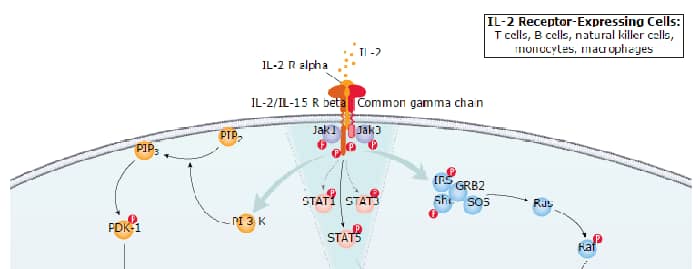Human/Mouse/Rat Akt1 Antibody Summary
Ser2-Ala480
Accession # P31749
Applications
Please Note: Optimal dilutions should be determined by each laboratory for each application. General Protocols are available in the Technical Information section on our website.
Scientific Data
 View Larger
View Larger
Detection of Human, Mouse, and Rat Akt1 by Western Blot. Western blot shows lysates of HeLa human cervical epithelial carcinoma cell line, HepG2 human hepatocellular carcinoma cell line, TS1 mouse helper T cell line, and PC-12 rat adrenal pheochromocytoma cell line. PVDF membrane was probed with 0.1 µg/mL Rabbit Anti-Human/Mouse/Rat Akt1 Antigen Affinity-purified Polyclonal Antibody (Catalog # AF1775) followed by HRP-conjugated Anti-Rabbit IgG Secondary Antibody (Catalog # HAF008). A specific band for Akt1 was detected at approximately 60 kDa (as indicated). This experiment was conducted under reducing conditions and using Immunoblot Buffer Group 1.
 View Larger
View Larger
Detection of human Akt1 by Western Blot. Western blot shows recombinant human Akt1, Akt2, and Akt3 (1 ng/lane). PVDF membrane was probed with 0.1 µg/mL Rabbit Anti-Human/Mouse/Rat Akt1 Antigen Affinity-purified Polyclonal Antibody (Catalog # AF1775) followed by HRP-conjugated Anti-Rabbit IgG Secondary Antibody (Catalog # HAF008). A specific band for Akt1 was detected at approximately 60 kDa (as indicated). This experiment was conducted under reducing conditions and using Immunoblot Buffer Group 1.
 View Larger
View Larger
Detection of Human Akt1 by Simple WesternTM. Simple Western lane view shows lysates of HeLa human cervical epithelial carcinoma cell line, loaded at 0.2 mg/mL. A specific band was detected for Akt1 at approximately 63 kDa (as indicated) using 1 µg/mL of Rabbit Anti-Human/Mouse/Rat Akt1 Antigen Affinity-purified Polyclonal Antibody (Catalog # AF1775). This experiment was conducted under reducing conditions and using the 12-230 kDa separation system. Non-specific interaction with the 230 kDa Simple Western standard may be seen with this antibody.
Reconstitution Calculator
Preparation and Storage
- 12 months from date of receipt, -20 to -70 °C as supplied.
- 1 month, 2 to 8 °C under sterile conditions after reconstitution.
- 6 months, -20 to -70 °C under sterile conditions after reconstitution.
Background: Akt1
Akt, also known as protein kinase B (PKB), is a central kinase in such diverse cellular processes as glucose uptake, cell cycle progression, and apoptosis. Three highly homologous members define the Akt family: Akt1 (PKB alpha ), Akt2 (PKB beta ), and Akt3 (PKB gamma ). Akt1 is the most ubiquitously expressed family member. All three Akts contain an amino-terminal pleckstrin homology domain, a central kinase domain, and a carboxyl-terminal regulatory domain.
Product Datasheets
Citations for Human/Mouse/Rat Akt1 Antibody
R&D Systems personnel manually curate a database that contains references using R&D Systems products. The data collected includes not only links to publications in PubMed, but also provides information about sample types, species, and experimental conditions.
4
Citations: Showing 1 - 4
Filter your results:
Filter by:
-
Dose-Dependent Biphasic Action of Quetiapine on AMPK Signalling via 5-HT7 Receptor: Exploring Pathophysiology of Clinical and Adverse Effects of Quetiapine
Authors: M Okada, K Fukuyama, E Motomura
International Journal of Molecular Sciences, 2022-08-14;23(16):.
Species: Rat
Sample Types: Cell Lysates
Applications: Simple Western -
Brexpiprazole Reduces 5-HT7 Receptor Function on Astroglial Transmission Systems
Authors: K Fukuyama, E Motomura, M Okada
International Journal of Molecular Sciences, 2022-06-12;23(12):.
Species: Rat
Sample Types: Cell Lysates
Applications: Simple Western -
Age-Dependent and Sleep/Seizure-Induced Pathomechanisms of Autosomal Dominant Sleep-Related Hypermotor Epilepsy
Authors: Fukuyama K, Okada M.
International Journal of Molecular Sciences
-
Exercise effects on gamma 3-AMPK activity, phosphorylation of Akt2 and AS160, and insulin-stimulated glucose uptake in insulin-resistant rat skeletal muscle
Authors: Mark W. Pataky, Edward B. Arias, Haiyan Wang, Xiaohua Zheng, Gregory D. Cartee
Journal of Applied Physiology
FAQs
No product specific FAQs exist for this product, however you may
View all Antibody FAQsReviews for Human/Mouse/Rat Akt1 Antibody
There are currently no reviews for this product. Be the first to review Human/Mouse/Rat Akt1 Antibody and earn rewards!
Have you used Human/Mouse/Rat Akt1 Antibody?
Submit a review and receive an Amazon gift card.
$25/€18/£15/$25CAN/¥75 Yuan/¥2500 Yen for a review with an image
$10/€7/£6/$10 CAD/¥70 Yuan/¥1110 Yen for a review without an image















